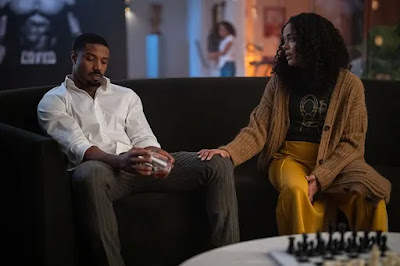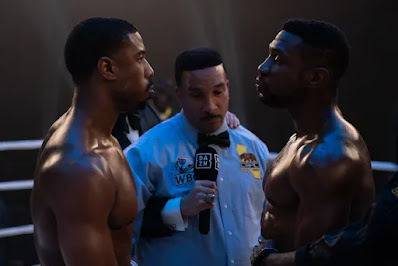As the previous movie concluded, Adonis Creed (Michael B. Jordan) had not so much won the Cold War in defeating the son of Ivan Drago as he had sutured his own wounded male pride. And as “Creed III” begins, Adonis has retired as the champ and into a life of boxing promotion and being a family man with his wife Bianca (Tessa Thompson) and daughter Amara (Mila Davis-Kent), seemingly content, evoked in a wide shot of the trio sunk into the sofa of their living room, glowing in the soft light, infusing their sprawling Los Angeles mansion with genuine warmth and love. The story turns on the return of Adonis’s childhood friend Damian Anderson (Jonathan Majors), just released from prison after 18 years (and whose “Dame” nickname just goes to show that sometimes you can’t improve on real life). His sentence stemmed from events established in the movie’s prologue when as kids, Dame, himself an aspiring pugilist, takes the fall for Adonis, meaning the former’s return is appended with ulterior motives, all leading back to a climactic showdown between old friends in the ring, a masculine rite.
As a villain, Dame is exemplary, played to the hilt by Majors with a livewire twitchiness that always keeps you on edge, investing even the character’s more polite moments with an unexpected tinge of menace, and hinting at wells of pain burbling up beneath at being forgotten by his friend. (Since the movie’s release in March, Majors was arrested on accusations of domestic violence and his trial is now set to begin next month.) In a nightclub scene with Bianca, where they pry into each other’s respective histories, you can feel that undercurrent of menace acutely, his tip-toeing the line of exposing his motivations but never quite giving himself away, and Thompson playing it in such a way that she seems to innately sense something lurking below without the character explicitly stating it.
Thompson is sensational in this scene, as she is throughout the movie, putting me in mind of Lindsay Crouse’s small but vital role in “The Insider,” telling Al Pacino’s co-protagonist to “get some perspective.” Essentially, Bianca is telling Adonis to get some perspective all throughout “Creed III,” their dramatic scenes crackling as much as their romantic scenes, a real portrait tucked inside this movie of a couple hashing things out. True, her own singing career being sidelined because of her advanced hearing loss comes across less like a true subplot than an echo of both Adonis and Dame’s trials, while Amara’s storyline about fighting at school, while deftly handled, still feels conspicuously like set-up, a future movie in which Amara becomes Gigi Bryant as a boxer. Even so, mother and daughter movingly evoke the adage that behind every black man there is a strong black woman, or two of them in this case.
Unlike “Creed II,” however, in which the best scene involved Adonis’s stepmother Mary Anne (Phylicia Rashad) refusing to give her blessing for his big fight, calling his masculine thirst for vengeance on the carpet, her big scene here is one in which she reveals herself having protected Adonis from Dame, refusing to deliver the latter’s letters when he was in prison. It provokes a tantalizing moral question, whether cutting off ties truly allowed Adonis to grow and prosper and what he owed Dame while his friend wiled away behind bars, but then evades answering them, content merely to utilize Dame’s anger as dramatic fuel rather than the rageful cries of the incarcerated while allowing one faceoff in the ring for the heavyweight championship of the world settle the score.
This is all the more disappointing because, as director, Jordan seems more invigorated by the dramatic scenes between people than the boxing sequences, epitomized in the training montage that feels merely functional. The lone exception happens during Adonis and Dame’s brawl in the ring when Jordan chooses to expressionistically remove the crowd from the scenes, rendering as just the two men in the ring, all alone, one on one. It spiritually honors the end of “Rocky III,” true, though I thought more of the heightened conclusion to Sam Shepard’s play “True West,” two brothers, fists raised. Of course, “Creed III” can’t conclude just there, stewing in fury that can’t be resolved, left to slug it out in perpetuity. No, this is Hollywood, which is why the training montage ends at the Hollywood sign, and when the fight is over, one last look around the ring puts everything in order.





No comments:
Post a Comment